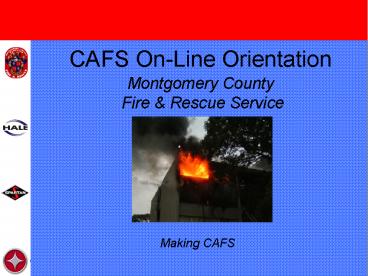MCFRS Hale Q-MAX CAFSPro Operator Orientation - PowerPoint PPT Presentation
Title:
MCFRS Hale Q-MAX CAFSPro Operator Orientation
Description:
X-Type Mixers Stainless Steel Design 4 Variable ... Important CAFS Components FoamLogix Proportioning System 5.0 GPM foam pump Rotary Gear Design driven by electric ... – PowerPoint PPT presentation
Number of Views:69
Avg rating:3.0/5.0
Title: MCFRS Hale Q-MAX CAFSPro Operator Orientation
1
CAFS On-Line Orientation Montgomery County Fire
Rescue Service
Making CAFS
2
Making CAFS
- Module Objectives
- Learn and Identify Main Components
- Learn how these components work
- Understand how the components work together to
produce CAFS
3
How does it work?
4
How does it work?
Water leaves discharge side of the pump. It
then goes into the foam manifold where foam is
added (from the foam pump). It then goes into
the CAFS manifold where air is added (from air
compressor). Purple arrows represent check
valves which prevent backflow of foam solution or
CAFS.
5
How does it work?
After air is injected in the CAFS Manifold, the
foam product passes through mixing grates. This
provides agitation. Further agitation and mixing
occurs in the hose lines. Finished foam then
comes out of the nozzle. Air injection
valve Mixing grates
6
Important CAFS Components
- Air Compressor
- Air Compressor
- Air/Oil Separator
- Water/Oil Heat Exchanger
- Foam Pump
- FoamLogix Pump
- Paddlewheel Flow Sensor
- Pump (Foam Manifold)
- Stainless Steel Manifold
- X-type Mixers
7
FoamLogix Proportioning System
- 5.0 GPM foam pump
- Rotary Gear Design driven by electric motor.
- Electronic Controller Interface - determines how
much concentrate gets pumped into Foam manifold.
- If water pump discharge pressure is over 250 psi,
the foam pump will not be able to inject foam
concentrate into the water stream.
8
Hale Approved Compatible List
MCFRS will be using National Foams Knockdown for
Class A Foam. This is the only foam that should
be put in the Class A foam tanks.
9
Paddlewheel Flow Sensor
- Internal Paddlewheel Design
- Accurate from 30 to 800 gpm
- Sits in foam manifold
- Talks to Foam Pump ECI to tell it how much foam
concentrate to inject.
10
Air Compressor
- Rotary Screw Oil-Bathed Design - oil is necessary
for cooling reasons - 210 SCFM rating - which is one of the largest on
market - Belt-Driven off of the fire pump gear box
- No load start
- Delivers 75 to 150 psi
11
Compressor Air/Oil Separator
- Element based
- Also acts as oil reservoir
- Provides some over pressure protection
- Oil Level Sight Tube
12
Air/Oil Separator
- Large Min/Max Sticker
- DO NOT OVERFILL!
- DO NOT OVERFILL!
- Check when oil is cold and therefore has no froth
13
Water/Oil Heat Exchanger
- Pump Water Fed - line runs from discharge side of
pump back to intake. This is critical for
keeping compressor cooled. It is critical to
keep water circulating in your pump.
14
Water/Oil Heat Exchanger Strainer
This strainer protects the air compressor
water/oil heat exchanger. The strainer should
be cleaned out after every use of the CAFS
system. Do NOT open this cap when the pump is
engaged - the cap will be under pressure and
could seriously injure you.
15
Maintenance Points
- Remove and clean Water/Oil heat exchanger
strainer every use - Compressor air filter should be changed every
time the engine air filter is changed
- Bleed water out of the Air/Oil Separator every
month - The Air/Oil Separator Oil and Filter should be
changed every time the engine oil is changed
16
Foam Manifold
- Made out of Stainless Steel to resist corrosive
effects of foam - Capable of up to 1000 GPM Flow - all
pre-connected handlines are plumbed off of this
manifold. Therefore you are limited to an
combined total flow of 1000 gpm at any one time
through your handlines. - Pump panel discharges are not plumbed off this
manifold.
17
X-Type Mixers
- Stainless Steel Design
- 4 Variable Position Fingered grates
Flow
18
Bringing it All Together
19
Review Questions
When should the oil in the air compressor oil
reservoir be checked? How does the foam pump know
how much foam concentrate to inject into the
water stream? Put the following terms in the
order in which water flows through them to become
CAFS. Also list in which parts the foam and air
get added. CAFS Manifold Discharge
Manifold Foam Manifold Fire Pump Check Valves
(can use more than once) How many CFM can the air
compressor produce?

